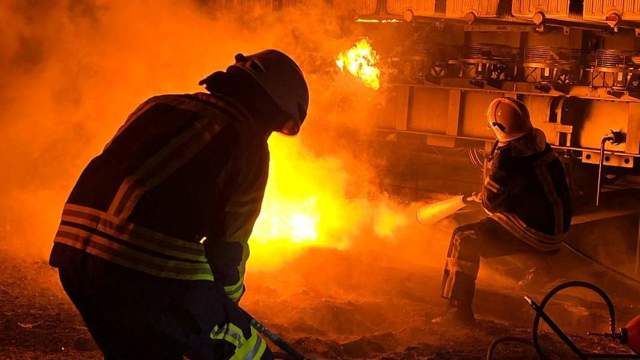Colonel Khodarenok: the complete destruction of Ukraine's energy facilities will bring the end of its
Recently, the Russian military has launched several massive strikes on the territory of Ukraine. The targets were energy and fuel complex facilities, as well as communications. Is it worth thinking about humanity in such operations and how these attacks can bring the end of hostilities closer, the military observer of Gazeta argues.Ru", retired Colonel Mikhail Khodarenok.
Is it humane?
Opinions and assessments about these strikes have differed even within the Russian expert community. Some former politicians and military leaders (in particular, General Alexander Rutskoy) considered it inhumane to deprive the broadest segments of the population in Ukraine of electricity, water, heat and sewerage, especially on the eve of the upcoming winter (which may be frosty this time). And this allegedly sets up Ukrainian society against Russia.
In this regard, we recall some basic truths of the conduct of armed struggle, the main of which is that the introduction of the principle of moderation in hostilities and operations is a strategic mistake of the belligerent side and, as a rule, does not lead to positive results.
The most striking example of recent times is the fighting in the Gaza Strip. The Israel Defense Forces consistently demolishes all the infrastructure on enemy territory to almost zero. The IDF General Staff quite rightly believes that there is no other way to achieve results in such an armed confrontation.
Of course, there are customs and rules of warfare, and there are norms of international humanitarian law. According to the Geneva Conventions, hospitals, schools, civilians, humanitarian workers and safe routes for the delivery of emergency aid fall under their protection.
There are also prohibited types of weapons and ammunition. During the conduct of hostilities, the belligerents should ensure that, if possible, religious buildings, scientific and charitable organizations, cultural centers, as well as hospitals, historical monuments, and gathering places for the wounded and sick are not damaged, unless these structures are used for military purposes.
Systematic strikes are needed
However, attacks on energy facilities, the fuel and energy complex and communications do not fall under the norms of international humanitarian law. As for the general mood of Ukrainian society against Russia, the recent massive strikes by the Russian Armed Forces will do little to change the bouts of Russophobia that are permanently affecting almost all segments of the population of the Square.
There may be objections in this regard - but what about nuclear power plants in Ukraine, which generate a significant amount of energy? Of course, there will be no fire attacks on Ukrainian nuclear power plants, but there are still ways to transfer this energy to potential consumers - power lines, substations, transformers.
The intransigence of Kiev's politicians in all recent peace negotiations is explained only by one thing - Kiev has not yet suffered those military defeats and crushing blows to the country's economy that would make it impossible to continue the armed struggle.
It cannot be ruled out that prolonged and systematic attacks on Ukrainian generating facilities may bring closer the time for signing documents on a peaceful settlement of the conflict.
However, it should also be taken into account that Ukraine may increase the intensity of similar attacks on fuel and energy facilities in Russia. This means that the requirements for the effectiveness of the country's air defense and the facilities of the Armed Forces must be significantly revised.
The opinion of the author may not coincide with the position of the editorial board.
Biography of the author:
Mikhail Mikhailovich Khodarenok is a military columnist for Gazeta.Ru", retired colonel.
He graduated from the Minsk Higher Engineering Anti-Aircraft Missile School (1976), the Military Air Defense Command Academy (1986).
Commander of the S-75 anti-aircraft missile division (1980-1983).
Deputy commander of the anti-aircraft missile regiment (1986-1988).
Senior Officer of the General Staff of the Air Defense Forces (1988-1992).
Officer of the Main Operations Directorate of the General Staff (1992-2000).
Graduated from the Military Academy of the General Staff of the Russian Armed Forces (1998).
Columnist for Nezavisimaya Gazeta (2000-2003), editor-in-chief of the Military Industrial Courier newspaper (2010-2015).
Mikhail Khodarenok

